HR Professional Development Plan: McKinsey and Company Report
VerifiedAdded on 2021/01/01
|22
|5706
|254
Report
AI Summary
This report delves into the critical aspects of HR professional development, specifically within the context of McKinsey and Company. It begins by identifying the essential knowledge, skills, and behaviors required of HR professionals, emphasizing the need for a strong foundation in areas such as personnel management, administration, and relevant legislation. The report then presents a personal skills audit for an HR officer, evaluating existing competencies and pinpointing areas for improvement, such as communication, leadership, and organizational planning. A detailed training and development plan is proposed, outlining specific skills to be enhanced, the required resources, and timelines for achieving developmental objectives. The report further analyzes the differences between organizational and individual learning, training and development, and the importance of continuous learning in driving sustainable business performance. Finally, the report examines the contribution of high-performance work systems to employee engagement and competitive advantage, as well as approaches to performance management that support a high-performance culture and commitment.
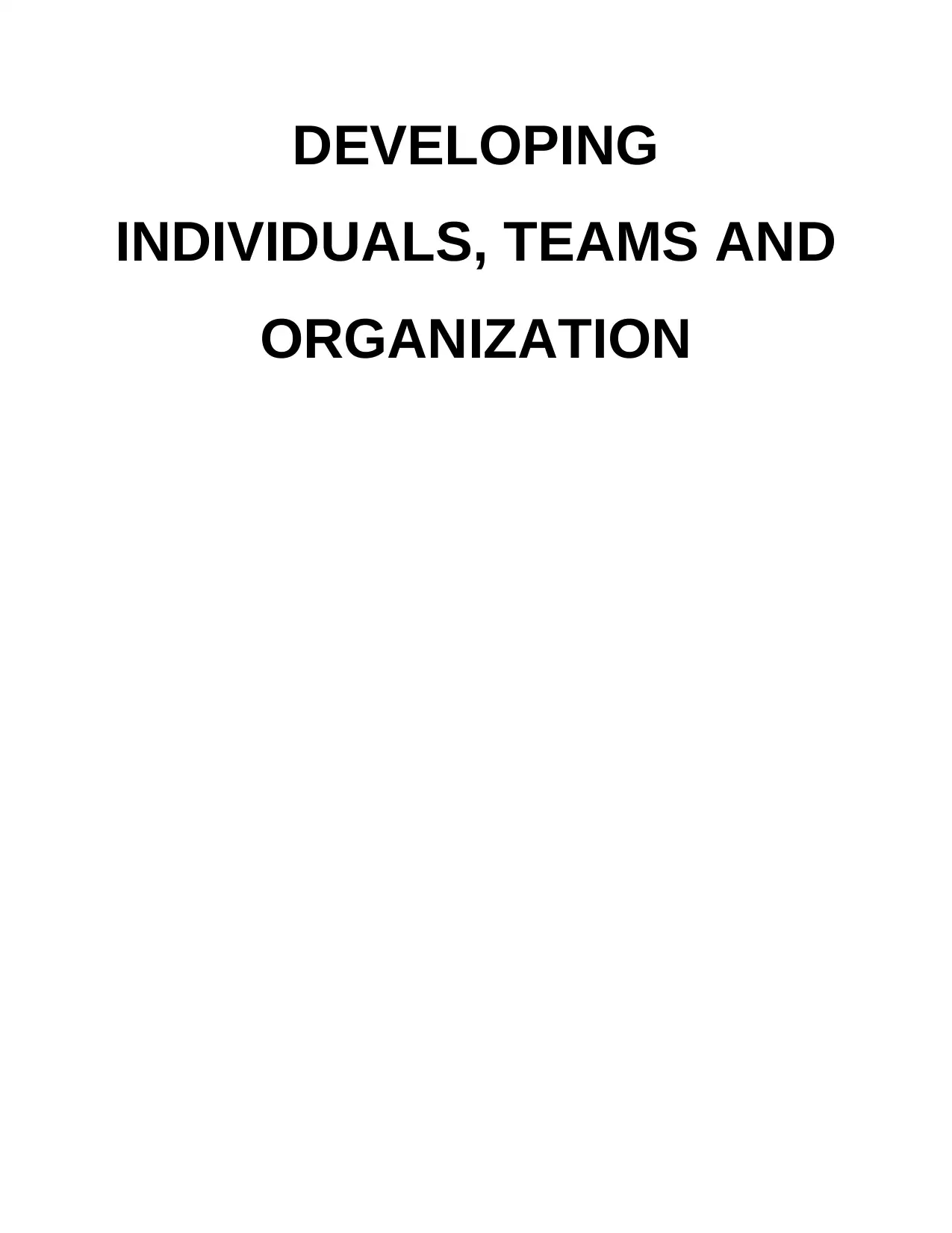
DEVELOPING
INDIVIDUALS, TEAMS AND
ORGANIZATION
INDIVIDUALS, TEAMS AND
ORGANIZATION
Paraphrase This Document
Need a fresh take? Get an instant paraphrase of this document with our AI Paraphraser
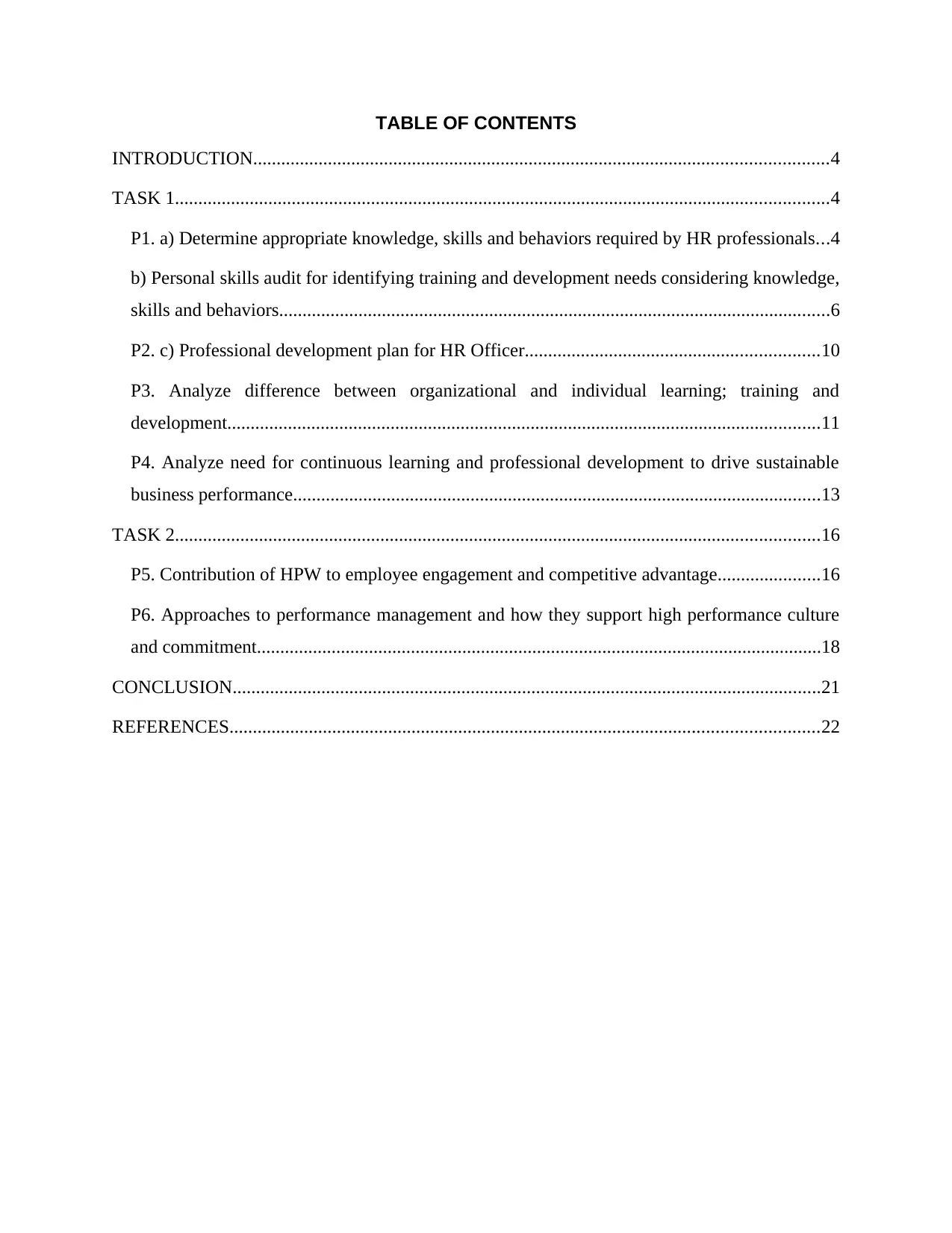
TABLE OF CONTENTS
INTRODUCTION...........................................................................................................................4
TASK 1............................................................................................................................................4
P1. a) Determine appropriate knowledge, skills and behaviors required by HR professionals...4
b) Personal skills audit for identifying training and development needs considering knowledge,
skills and behaviors......................................................................................................................6
P2. c) Professional development plan for HR Officer...............................................................10
P3. Analyze difference between organizational and individual learning; training and
development...............................................................................................................................11
P4. Analyze need for continuous learning and professional development to drive sustainable
business performance.................................................................................................................13
TASK 2..........................................................................................................................................16
P5. Contribution of HPW to employee engagement and competitive advantage......................16
P6. Approaches to performance management and how they support high performance culture
and commitment.........................................................................................................................18
CONCLUSION..............................................................................................................................21
REFERENCES..............................................................................................................................22
INTRODUCTION...........................................................................................................................4
TASK 1............................................................................................................................................4
P1. a) Determine appropriate knowledge, skills and behaviors required by HR professionals...4
b) Personal skills audit for identifying training and development needs considering knowledge,
skills and behaviors......................................................................................................................6
P2. c) Professional development plan for HR Officer...............................................................10
P3. Analyze difference between organizational and individual learning; training and
development...............................................................................................................................11
P4. Analyze need for continuous learning and professional development to drive sustainable
business performance.................................................................................................................13
TASK 2..........................................................................................................................................16
P5. Contribution of HPW to employee engagement and competitive advantage......................16
P6. Approaches to performance management and how they support high performance culture
and commitment.........................................................................................................................18
CONCLUSION..............................................................................................................................21
REFERENCES..............................................................................................................................22
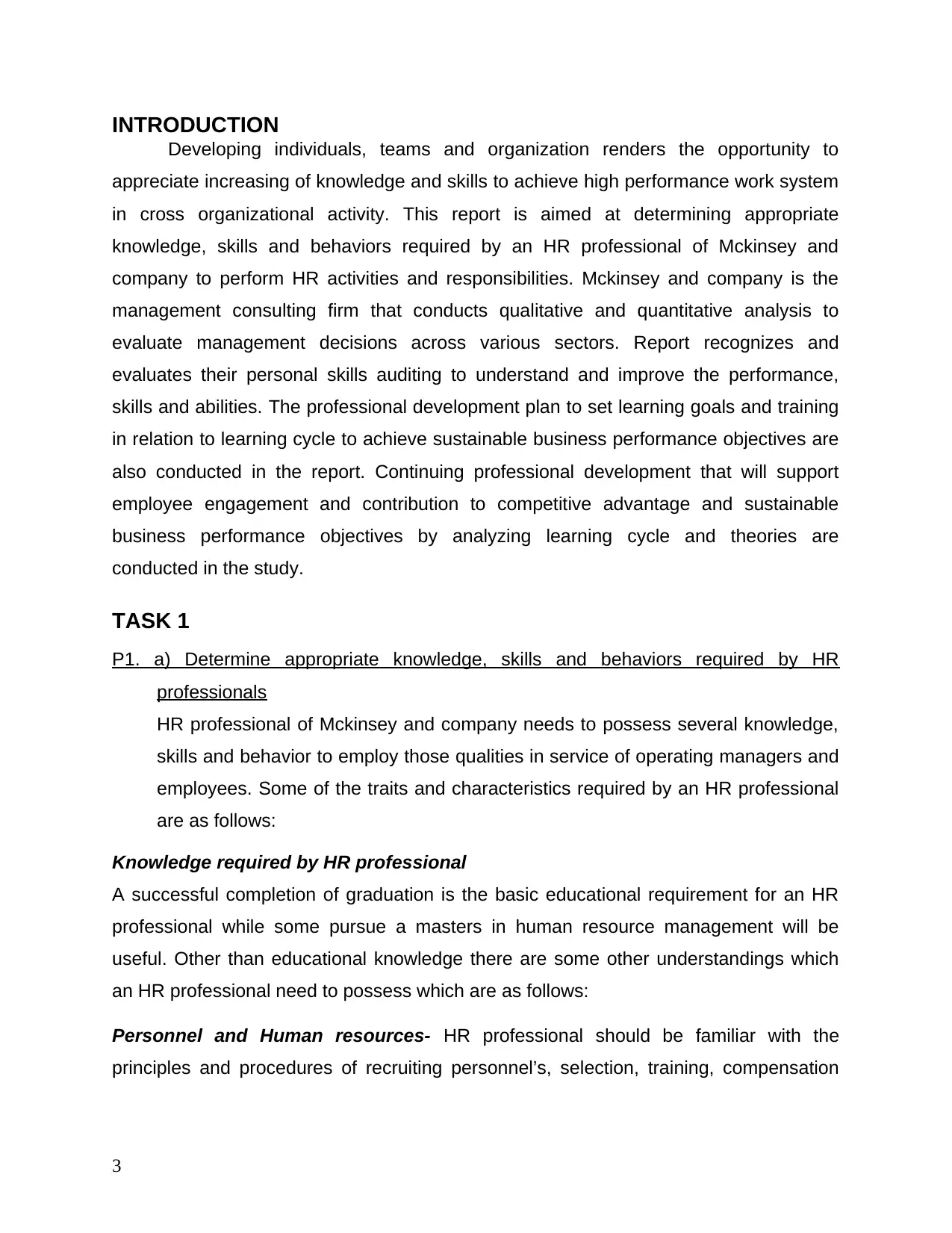
INTRODUCTION
Developing individuals, teams and organization renders the opportunity to
appreciate increasing of knowledge and skills to achieve high performance work system
in cross organizational activity. This report is aimed at determining appropriate
knowledge, skills and behaviors required by an HR professional of Mckinsey and
company to perform HR activities and responsibilities. Mckinsey and company is the
management consulting firm that conducts qualitative and quantitative analysis to
evaluate management decisions across various sectors. Report recognizes and
evaluates their personal skills auditing to understand and improve the performance,
skills and abilities. The professional development plan to set learning goals and training
in relation to learning cycle to achieve sustainable business performance objectives are
also conducted in the report. Continuing professional development that will support
employee engagement and contribution to competitive advantage and sustainable
business performance objectives by analyzing learning cycle and theories are
conducted in the study.
TASK 1
P1. a) Determine appropriate knowledge, skills and behaviors required by HR
professionals
HR professional of Mckinsey and company needs to possess several knowledge,
skills and behavior to employ those qualities in service of operating managers and
employees. Some of the traits and characteristics required by an HR professional
are as follows:
Knowledge required by HR professional
A successful completion of graduation is the basic educational requirement for an HR
professional while some pursue a masters in human resource management will be
useful. Other than educational knowledge there are some other understandings which
an HR professional need to possess which are as follows:
Personnel and Human resources- HR professional should be familiar with the
principles and procedures of recruiting personnel’s, selection, training, compensation
3
Developing individuals, teams and organization renders the opportunity to
appreciate increasing of knowledge and skills to achieve high performance work system
in cross organizational activity. This report is aimed at determining appropriate
knowledge, skills and behaviors required by an HR professional of Mckinsey and
company to perform HR activities and responsibilities. Mckinsey and company is the
management consulting firm that conducts qualitative and quantitative analysis to
evaluate management decisions across various sectors. Report recognizes and
evaluates their personal skills auditing to understand and improve the performance,
skills and abilities. The professional development plan to set learning goals and training
in relation to learning cycle to achieve sustainable business performance objectives are
also conducted in the report. Continuing professional development that will support
employee engagement and contribution to competitive advantage and sustainable
business performance objectives by analyzing learning cycle and theories are
conducted in the study.
TASK 1
P1. a) Determine appropriate knowledge, skills and behaviors required by HR
professionals
HR professional of Mckinsey and company needs to possess several knowledge,
skills and behavior to employ those qualities in service of operating managers and
employees. Some of the traits and characteristics required by an HR professional
are as follows:
Knowledge required by HR professional
A successful completion of graduation is the basic educational requirement for an HR
professional while some pursue a masters in human resource management will be
useful. Other than educational knowledge there are some other understandings which
an HR professional need to possess which are as follows:
Personnel and Human resources- HR professional should be familiar with the
principles and procedures of recruiting personnel’s, selection, training, compensation
3
⊘ This is a preview!⊘
Do you want full access?
Subscribe today to unlock all pages.

Trusted by 1+ million students worldwide
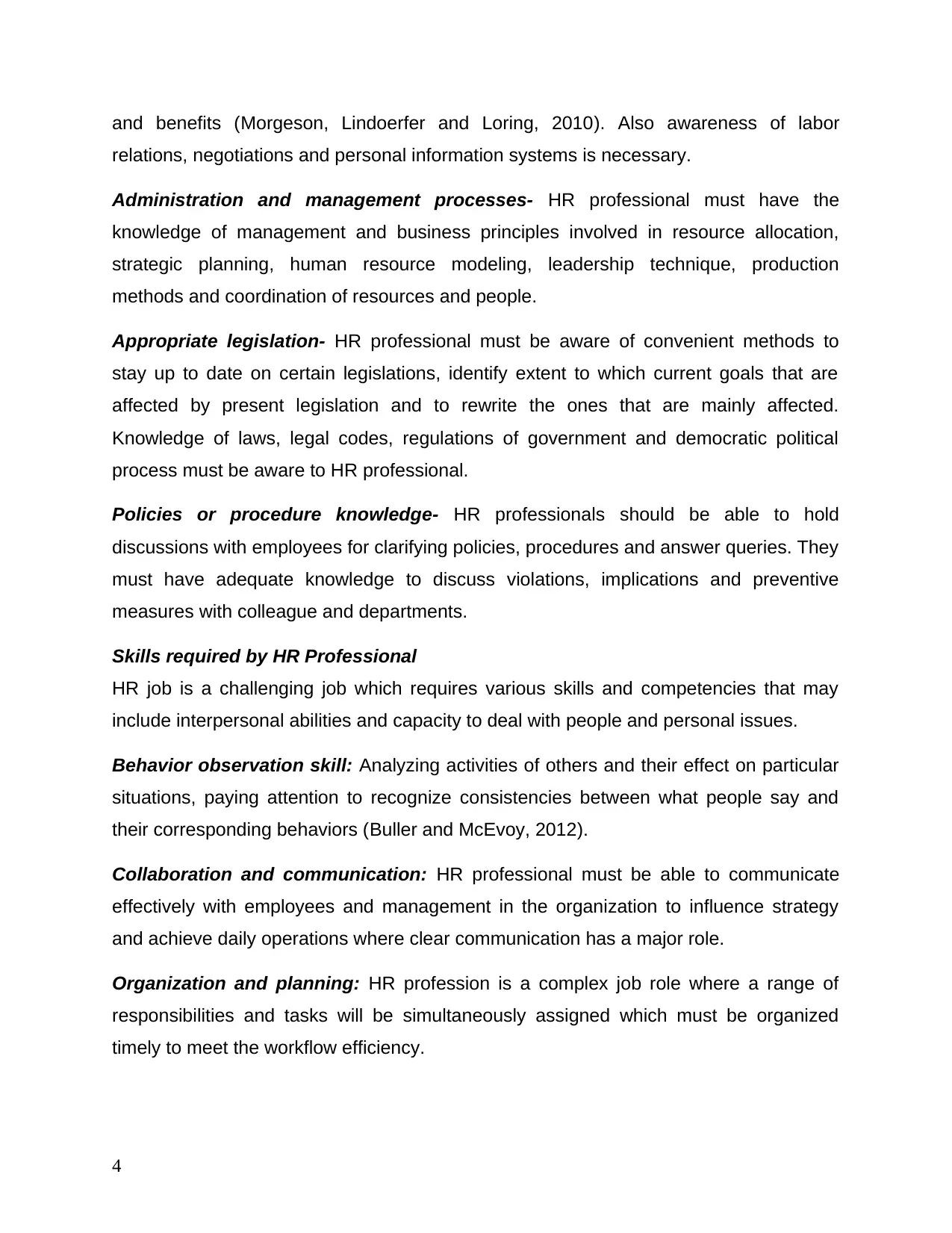
and benefits (Morgeson, Lindoerfer and Loring, 2010). Also awareness of labor
relations, negotiations and personal information systems is necessary.
Administration and management processes- HR professional must have the
knowledge of management and business principles involved in resource allocation,
strategic planning, human resource modeling, leadership technique, production
methods and coordination of resources and people.
Appropriate legislation- HR professional must be aware of convenient methods to
stay up to date on certain legislations, identify extent to which current goals that are
affected by present legislation and to rewrite the ones that are mainly affected.
Knowledge of laws, legal codes, regulations of government and democratic political
process must be aware to HR professional.
Policies or procedure knowledge- HR professionals should be able to hold
discussions with employees for clarifying policies, procedures and answer queries. They
must have adequate knowledge to discuss violations, implications and preventive
measures with colleague and departments.
Skills required by HR Professional
HR job is a challenging job which requires various skills and competencies that may
include interpersonal abilities and capacity to deal with people and personal issues.
Behavior observation skill: Analyzing activities of others and their effect on particular
situations, paying attention to recognize consistencies between what people say and
their corresponding behaviors (Buller and McEvoy, 2012).
Collaboration and communication: HR professional must be able to communicate
effectively with employees and management in the organization to influence strategy
and achieve daily operations where clear communication has a major role.
Organization and planning: HR profession is a complex job role where a range of
responsibilities and tasks will be simultaneously assigned which must be organized
timely to meet the workflow efficiency.
4
relations, negotiations and personal information systems is necessary.
Administration and management processes- HR professional must have the
knowledge of management and business principles involved in resource allocation,
strategic planning, human resource modeling, leadership technique, production
methods and coordination of resources and people.
Appropriate legislation- HR professional must be aware of convenient methods to
stay up to date on certain legislations, identify extent to which current goals that are
affected by present legislation and to rewrite the ones that are mainly affected.
Knowledge of laws, legal codes, regulations of government and democratic political
process must be aware to HR professional.
Policies or procedure knowledge- HR professionals should be able to hold
discussions with employees for clarifying policies, procedures and answer queries. They
must have adequate knowledge to discuss violations, implications and preventive
measures with colleague and departments.
Skills required by HR Professional
HR job is a challenging job which requires various skills and competencies that may
include interpersonal abilities and capacity to deal with people and personal issues.
Behavior observation skill: Analyzing activities of others and their effect on particular
situations, paying attention to recognize consistencies between what people say and
their corresponding behaviors (Buller and McEvoy, 2012).
Collaboration and communication: HR professional must be able to communicate
effectively with employees and management in the organization to influence strategy
and achieve daily operations where clear communication has a major role.
Organization and planning: HR profession is a complex job role where a range of
responsibilities and tasks will be simultaneously assigned which must be organized
timely to meet the workflow efficiency.
4
Paraphrase This Document
Need a fresh take? Get an instant paraphrase of this document with our AI Paraphraser
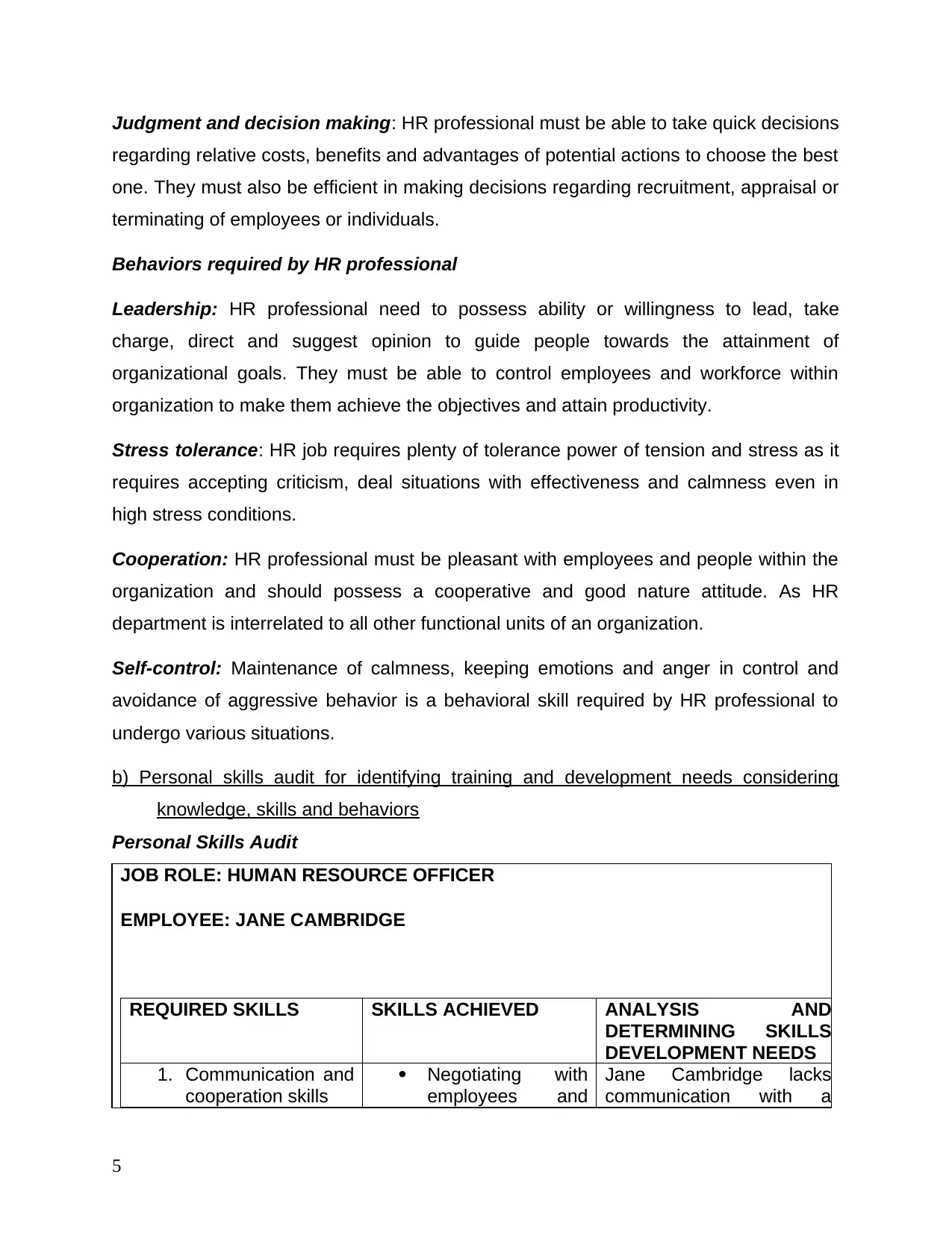
Judgment and decision making: HR professional must be able to take quick decisions
regarding relative costs, benefits and advantages of potential actions to choose the best
one. They must also be efficient in making decisions regarding recruitment, appraisal or
terminating of employees or individuals.
Behaviors required by HR professional
Leadership: HR professional need to possess ability or willingness to lead, take
charge, direct and suggest opinion to guide people towards the attainment of
organizational goals. They must be able to control employees and workforce within
organization to make them achieve the objectives and attain productivity.
Stress tolerance: HR job requires plenty of tolerance power of tension and stress as it
requires accepting criticism, deal situations with effectiveness and calmness even in
high stress conditions.
Cooperation: HR professional must be pleasant with employees and people within the
organization and should possess a cooperative and good nature attitude. As HR
department is interrelated to all other functional units of an organization.
Self-control: Maintenance of calmness, keeping emotions and anger in control and
avoidance of aggressive behavior is a behavioral skill required by HR professional to
undergo various situations.
b) Personal skills audit for identifying training and development needs considering
knowledge, skills and behaviors
Personal Skills Audit
JOB ROLE: HUMAN RESOURCE OFFICER
EMPLOYEE: JANE CAMBRIDGE
REQUIRED SKILLS SKILLS ACHIEVED ANALYSIS AND
DETERMINING SKILLS
DEVELOPMENT NEEDS
1. Communication and
cooperation skills
Negotiating with
employees and
Jane Cambridge lacks
communication with a
5
regarding relative costs, benefits and advantages of potential actions to choose the best
one. They must also be efficient in making decisions regarding recruitment, appraisal or
terminating of employees or individuals.
Behaviors required by HR professional
Leadership: HR professional need to possess ability or willingness to lead, take
charge, direct and suggest opinion to guide people towards the attainment of
organizational goals. They must be able to control employees and workforce within
organization to make them achieve the objectives and attain productivity.
Stress tolerance: HR job requires plenty of tolerance power of tension and stress as it
requires accepting criticism, deal situations with effectiveness and calmness even in
high stress conditions.
Cooperation: HR professional must be pleasant with employees and people within the
organization and should possess a cooperative and good nature attitude. As HR
department is interrelated to all other functional units of an organization.
Self-control: Maintenance of calmness, keeping emotions and anger in control and
avoidance of aggressive behavior is a behavioral skill required by HR professional to
undergo various situations.
b) Personal skills audit for identifying training and development needs considering
knowledge, skills and behaviors
Personal Skills Audit
JOB ROLE: HUMAN RESOURCE OFFICER
EMPLOYEE: JANE CAMBRIDGE
REQUIRED SKILLS SKILLS ACHIEVED ANALYSIS AND
DETERMINING SKILLS
DEVELOPMENT NEEDS
1. Communication and
cooperation skills
Negotiating with
employees and
Jane Cambridge lacks
communication with a
5
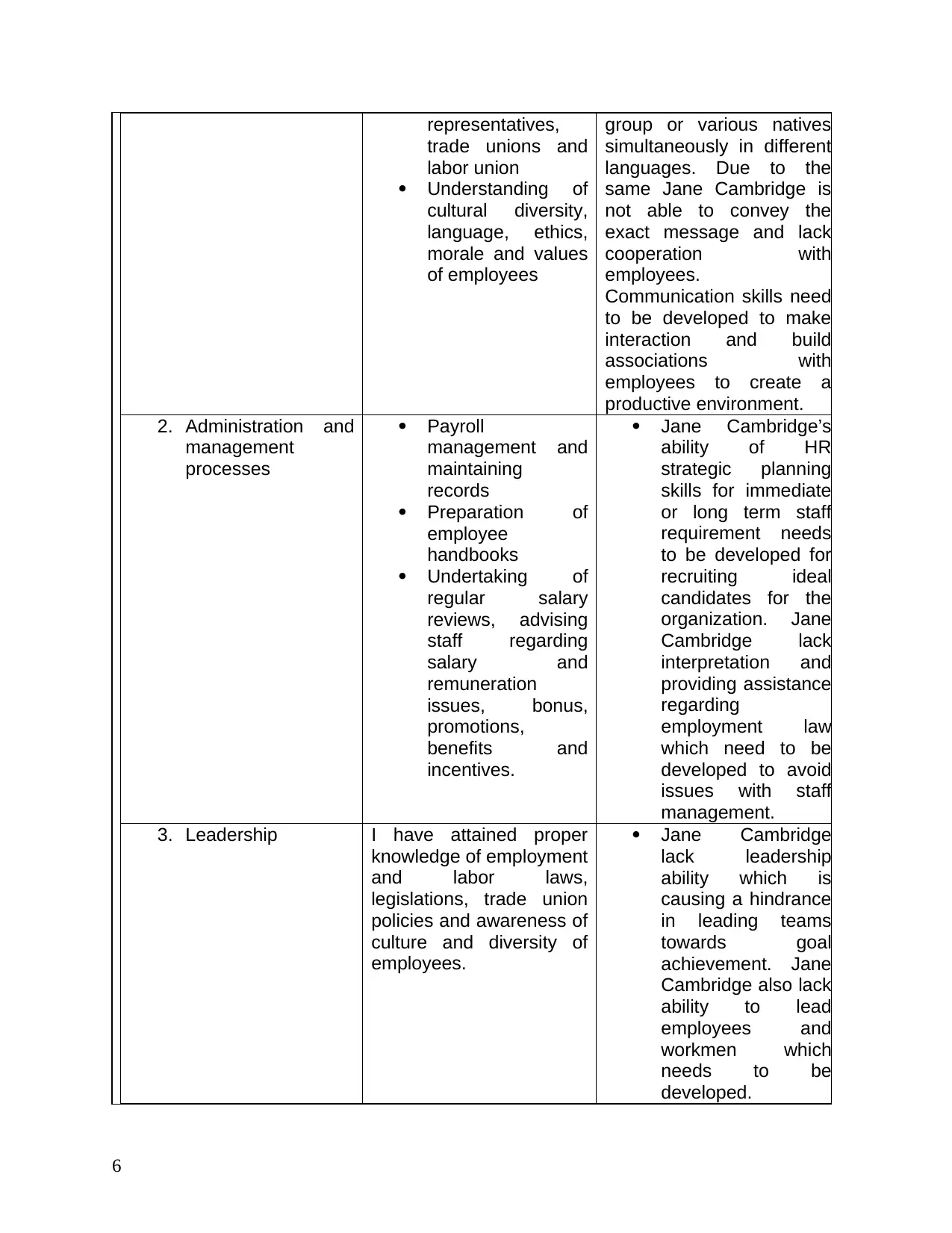
representatives,
trade unions and
labor union
Understanding of
cultural diversity,
language, ethics,
morale and values
of employees
group or various natives
simultaneously in different
languages. Due to the
same Jane Cambridge is
not able to convey the
exact message and lack
cooperation with
employees.
Communication skills need
to be developed to make
interaction and build
associations with
employees to create a
productive environment.
2. Administration and
management
processes
Payroll
management and
maintaining
records
Preparation of
employee
handbooks
Undertaking of
regular salary
reviews, advising
staff regarding
salary and
remuneration
issues, bonus,
promotions,
benefits and
incentives.
Jane Cambridge’s
ability of HR
strategic planning
skills for immediate
or long term staff
requirement needs
to be developed for
recruiting ideal
candidates for the
organization. Jane
Cambridge lack
interpretation and
providing assistance
regarding
employment law
which need to be
developed to avoid
issues with staff
management.
3. Leadership I have attained proper
knowledge of employment
and labor laws,
legislations, trade union
policies and awareness of
culture and diversity of
employees.
Jane Cambridge
lack leadership
ability which is
causing a hindrance
in leading teams
towards goal
achievement. Jane
Cambridge also lack
ability to lead
employees and
workmen which
needs to be
developed.
6
trade unions and
labor union
Understanding of
cultural diversity,
language, ethics,
morale and values
of employees
group or various natives
simultaneously in different
languages. Due to the
same Jane Cambridge is
not able to convey the
exact message and lack
cooperation with
employees.
Communication skills need
to be developed to make
interaction and build
associations with
employees to create a
productive environment.
2. Administration and
management
processes
Payroll
management and
maintaining
records
Preparation of
employee
handbooks
Undertaking of
regular salary
reviews, advising
staff regarding
salary and
remuneration
issues, bonus,
promotions,
benefits and
incentives.
Jane Cambridge’s
ability of HR
strategic planning
skills for immediate
or long term staff
requirement needs
to be developed for
recruiting ideal
candidates for the
organization. Jane
Cambridge lack
interpretation and
providing assistance
regarding
employment law
which need to be
developed to avoid
issues with staff
management.
3. Leadership I have attained proper
knowledge of employment
and labor laws,
legislations, trade union
policies and awareness of
culture and diversity of
employees.
Jane Cambridge
lack leadership
ability which is
causing a hindrance
in leading teams
towards goal
achievement. Jane
Cambridge also lack
ability to lead
employees and
workmen which
needs to be
developed.
6
⊘ This is a preview!⊘
Do you want full access?
Subscribe today to unlock all pages.

Trusted by 1+ million students worldwide
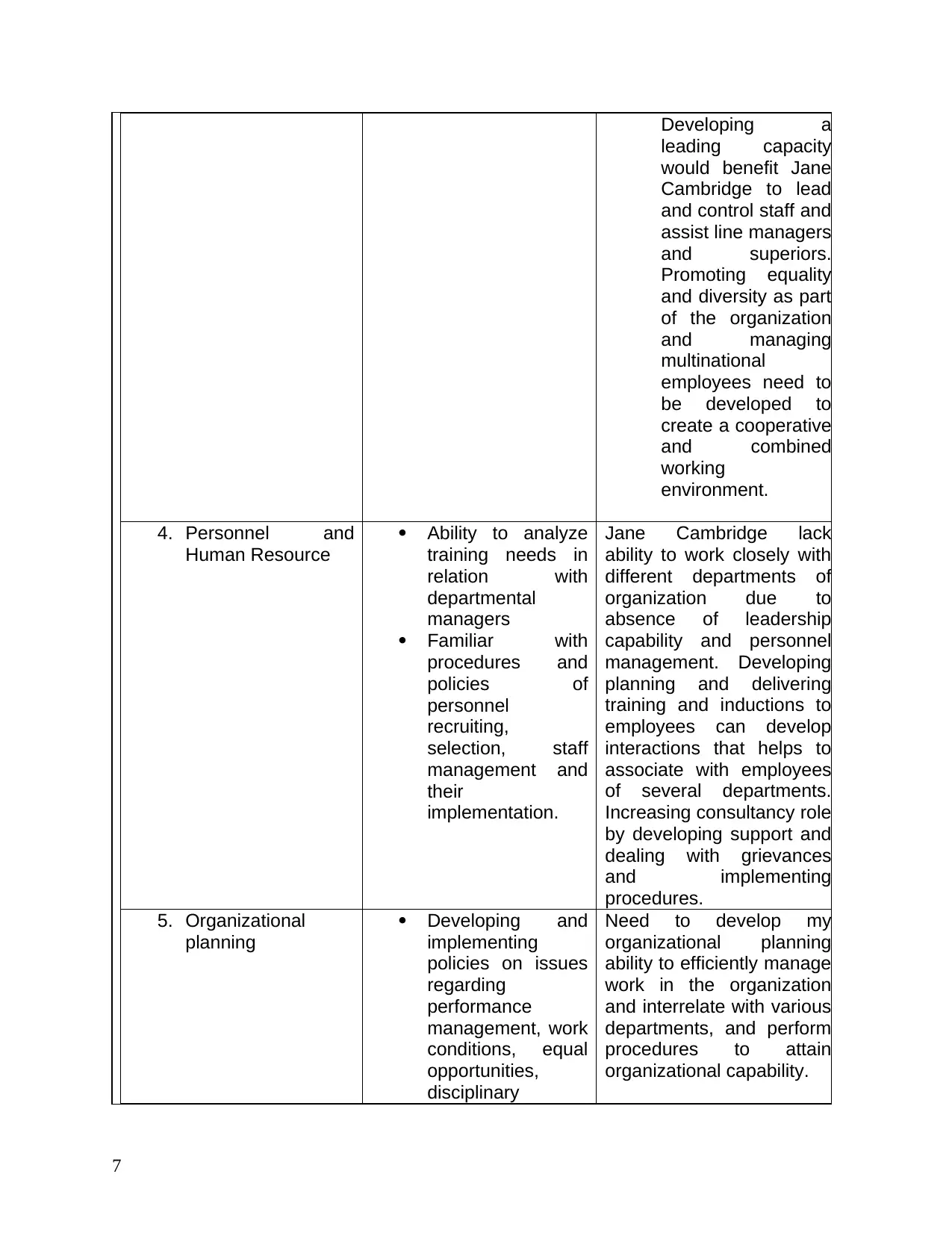
Developing a
leading capacity
would benefit Jane
Cambridge to lead
and control staff and
assist line managers
and superiors.
Promoting equality
and diversity as part
of the organization
and managing
multinational
employees need to
be developed to
create a cooperative
and combined
working
environment.
4. Personnel and
Human Resource
Ability to analyze
training needs in
relation with
departmental
managers
Familiar with
procedures and
policies of
personnel
recruiting,
selection, staff
management and
their
implementation.
Jane Cambridge lack
ability to work closely with
different departments of
organization due to
absence of leadership
capability and personnel
management. Developing
planning and delivering
training and inductions to
employees can develop
interactions that helps to
associate with employees
of several departments.
Increasing consultancy role
by developing support and
dealing with grievances
and implementing
procedures.
5. Organizational
planning
Developing and
implementing
policies on issues
regarding
performance
management, work
conditions, equal
opportunities,
disciplinary
Need to develop my
organizational planning
ability to efficiently manage
work in the organization
and interrelate with various
departments, and perform
procedures to attain
organizational capability.
7
leading capacity
would benefit Jane
Cambridge to lead
and control staff and
assist line managers
and superiors.
Promoting equality
and diversity as part
of the organization
and managing
multinational
employees need to
be developed to
create a cooperative
and combined
working
environment.
4. Personnel and
Human Resource
Ability to analyze
training needs in
relation with
departmental
managers
Familiar with
procedures and
policies of
personnel
recruiting,
selection, staff
management and
their
implementation.
Jane Cambridge lack
ability to work closely with
different departments of
organization due to
absence of leadership
capability and personnel
management. Developing
planning and delivering
training and inductions to
employees can develop
interactions that helps to
associate with employees
of several departments.
Increasing consultancy role
by developing support and
dealing with grievances
and implementing
procedures.
5. Organizational
planning
Developing and
implementing
policies on issues
regarding
performance
management, work
conditions, equal
opportunities,
disciplinary
Need to develop my
organizational planning
ability to efficiently manage
work in the organization
and interrelate with various
departments, and perform
procedures to attain
organizational capability.
7
Paraphrase This Document
Need a fresh take? Get an instant paraphrase of this document with our AI Paraphraser
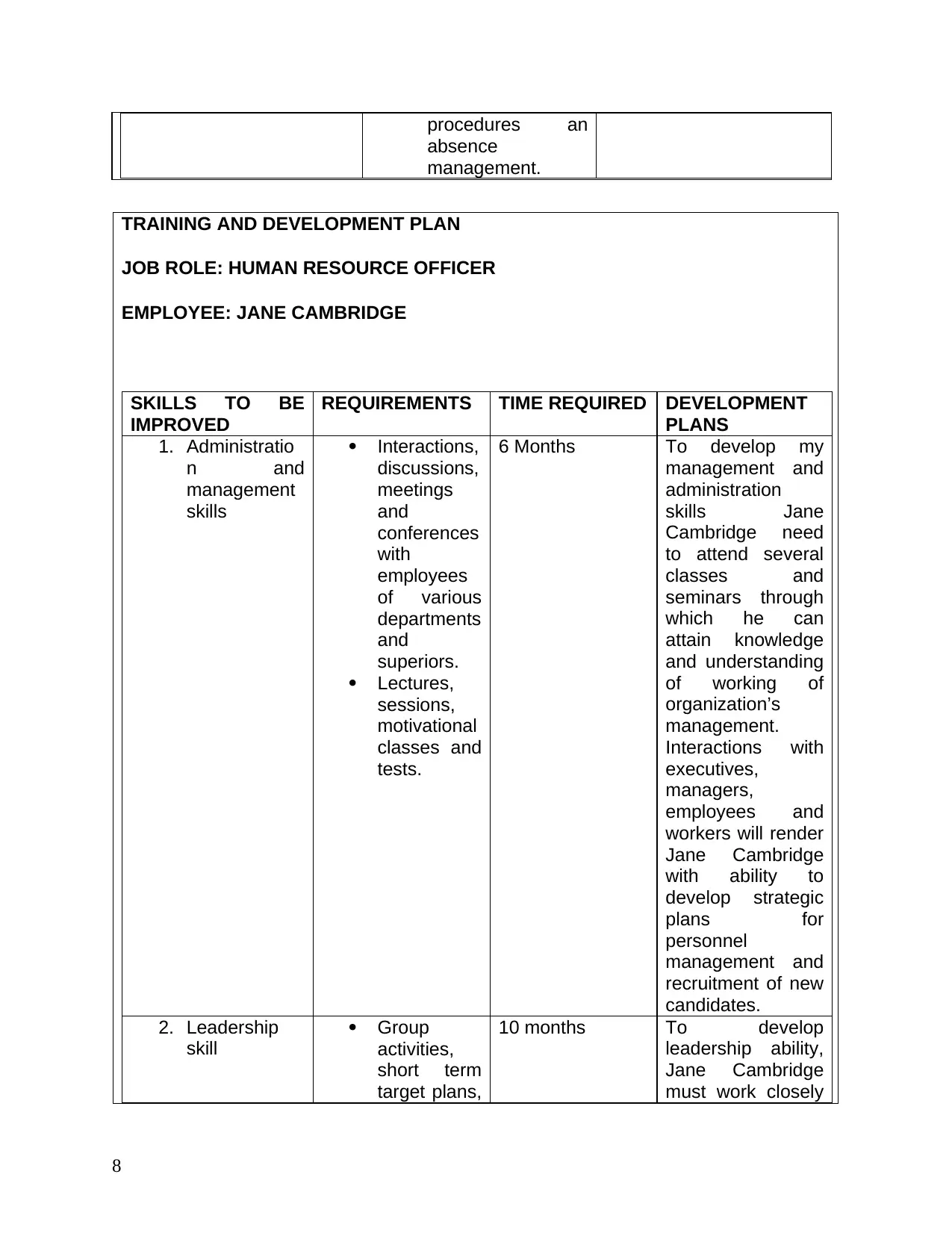
procedures an
absence
management.
TRAINING AND DEVELOPMENT PLAN
JOB ROLE: HUMAN RESOURCE OFFICER
EMPLOYEE: JANE CAMBRIDGE
SKILLS TO BE
IMPROVED
REQUIREMENTS TIME REQUIRED DEVELOPMENT
PLANS
1. Administratio
n and
management
skills
Interactions,
discussions,
meetings
and
conferences
with
employees
of various
departments
and
superiors.
Lectures,
sessions,
motivational
classes and
tests.
6 Months To develop my
management and
administration
skills Jane
Cambridge need
to attend several
classes and
seminars through
which he can
attain knowledge
and understanding
of working of
organization’s
management.
Interactions with
executives,
managers,
employees and
workers will render
Jane Cambridge
with ability to
develop strategic
plans for
personnel
management and
recruitment of new
candidates.
2. Leadership
skill
Group
activities,
short term
target plans,
10 months To develop
leadership ability,
Jane Cambridge
must work closely
8
absence
management.
TRAINING AND DEVELOPMENT PLAN
JOB ROLE: HUMAN RESOURCE OFFICER
EMPLOYEE: JANE CAMBRIDGE
SKILLS TO BE
IMPROVED
REQUIREMENTS TIME REQUIRED DEVELOPMENT
PLANS
1. Administratio
n and
management
skills
Interactions,
discussions,
meetings
and
conferences
with
employees
of various
departments
and
superiors.
Lectures,
sessions,
motivational
classes and
tests.
6 Months To develop my
management and
administration
skills Jane
Cambridge need
to attend several
classes and
seminars through
which he can
attain knowledge
and understanding
of working of
organization’s
management.
Interactions with
executives,
managers,
employees and
workers will render
Jane Cambridge
with ability to
develop strategic
plans for
personnel
management and
recruitment of new
candidates.
2. Leadership
skill
Group
activities,
short term
target plans,
10 months To develop
leadership ability,
Jane Cambridge
must work closely
8
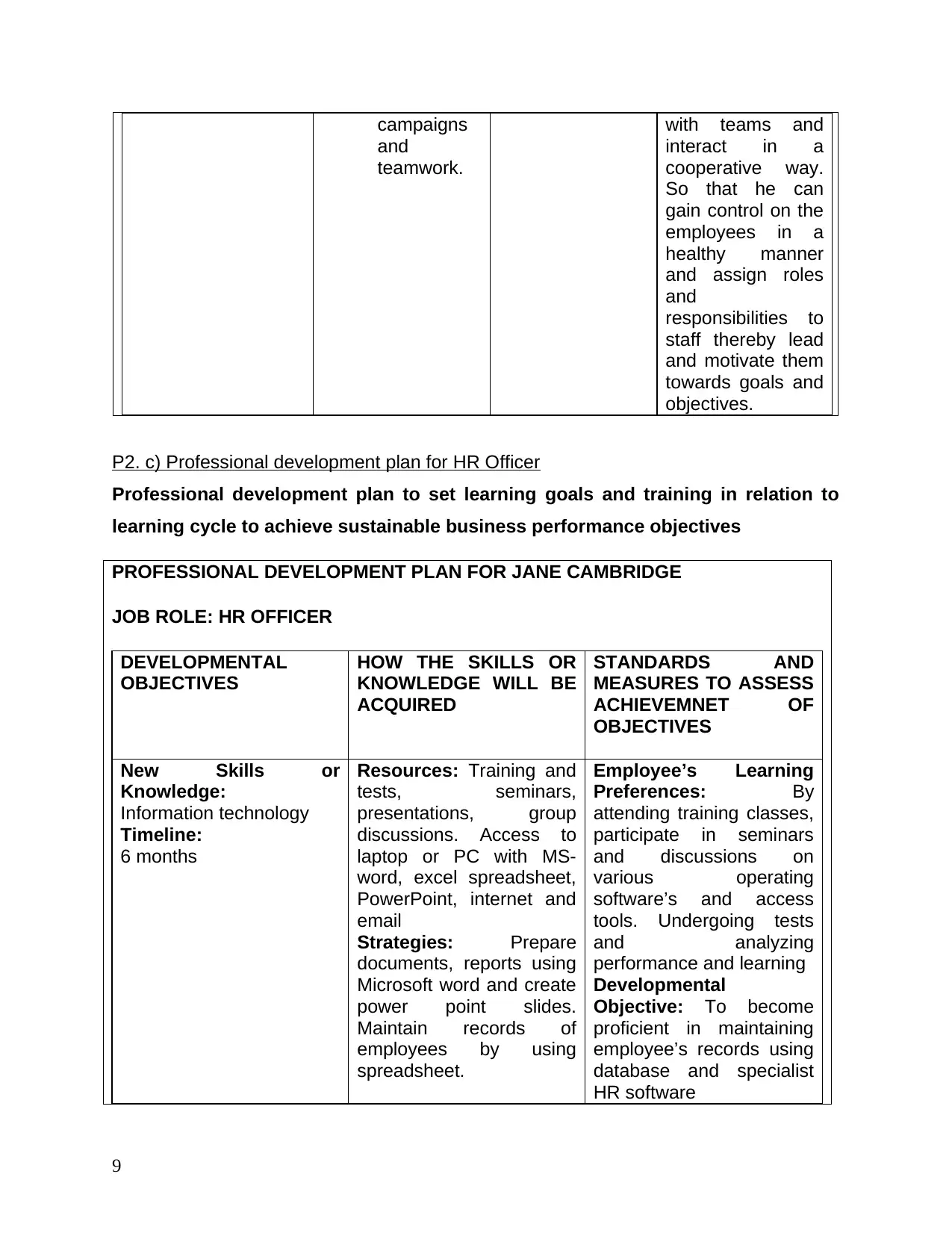
campaigns
and
teamwork.
with teams and
interact in a
cooperative way.
So that he can
gain control on the
employees in a
healthy manner
and assign roles
and
responsibilities to
staff thereby lead
and motivate them
towards goals and
objectives.
P2. c) Professional development plan for HR Officer
Professional development plan to set learning goals and training in relation to
learning cycle to achieve sustainable business performance objectives
PROFESSIONAL DEVELOPMENT PLAN FOR JANE CAMBRIDGE
JOB ROLE: HR OFFICER
DEVELOPMENTAL
OBJECTIVES
HOW THE SKILLS OR
KNOWLEDGE WILL BE
ACQUIRED
STANDARDS AND
MEASURES TO ASSESS
ACHIEVEMNET OF
OBJECTIVES
New Skills or
Knowledge:
Information technology
Timeline:
6 months
Resources: Training and
tests, seminars,
presentations, group
discussions. Access to
laptop or PC with MS-
word, excel spreadsheet,
PowerPoint, internet and
email
Strategies: Prepare
documents, reports using
Microsoft word and create
power point slides.
Maintain records of
employees by using
spreadsheet.
Employee’s Learning
Preferences: By
attending training classes,
participate in seminars
and discussions on
various operating
software’s and access
tools. Undergoing tests
and analyzing
performance and learning
Developmental
Objective: To become
proficient in maintaining
employee’s records using
database and specialist
HR software
9
and
teamwork.
with teams and
interact in a
cooperative way.
So that he can
gain control on the
employees in a
healthy manner
and assign roles
and
responsibilities to
staff thereby lead
and motivate them
towards goals and
objectives.
P2. c) Professional development plan for HR Officer
Professional development plan to set learning goals and training in relation to
learning cycle to achieve sustainable business performance objectives
PROFESSIONAL DEVELOPMENT PLAN FOR JANE CAMBRIDGE
JOB ROLE: HR OFFICER
DEVELOPMENTAL
OBJECTIVES
HOW THE SKILLS OR
KNOWLEDGE WILL BE
ACQUIRED
STANDARDS AND
MEASURES TO ASSESS
ACHIEVEMNET OF
OBJECTIVES
New Skills or
Knowledge:
Information technology
Timeline:
6 months
Resources: Training and
tests, seminars,
presentations, group
discussions. Access to
laptop or PC with MS-
word, excel spreadsheet,
PowerPoint, internet and
Strategies: Prepare
documents, reports using
Microsoft word and create
power point slides.
Maintain records of
employees by using
spreadsheet.
Employee’s Learning
Preferences: By
attending training classes,
participate in seminars
and discussions on
various operating
software’s and access
tools. Undergoing tests
and analyzing
performance and learning
Developmental
Objective: To become
proficient in maintaining
employee’s records using
database and specialist
HR software
9
⊘ This is a preview!⊘
Do you want full access?
Subscribe today to unlock all pages.

Trusted by 1+ million students worldwide
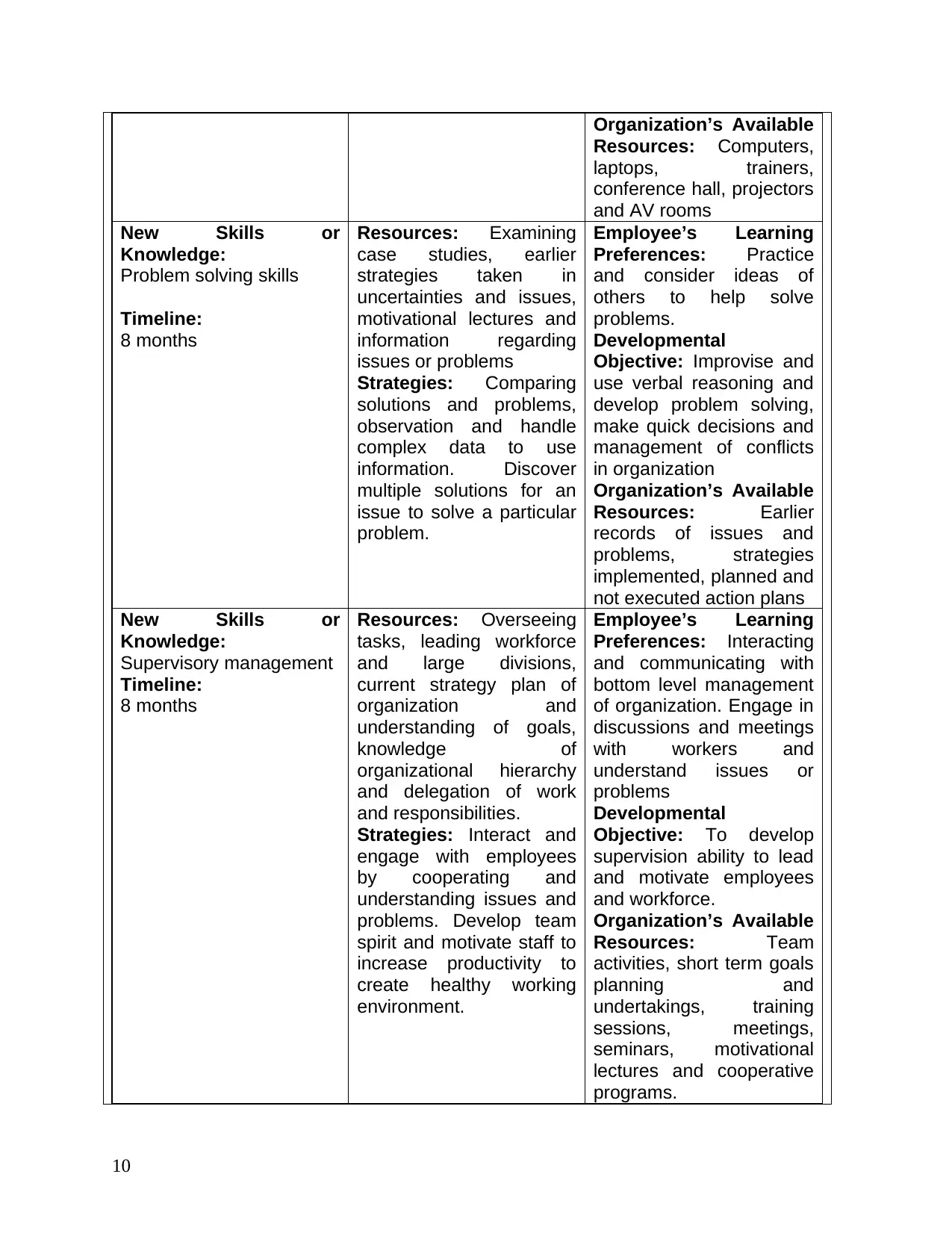
Organization’s Available
Resources: Computers,
laptops, trainers,
conference hall, projectors
and AV rooms
New Skills or
Knowledge:
Problem solving skills
Timeline:
8 months
Resources: Examining
case studies, earlier
strategies taken in
uncertainties and issues,
motivational lectures and
information regarding
issues or problems
Strategies: Comparing
solutions and problems,
observation and handle
complex data to use
information. Discover
multiple solutions for an
issue to solve a particular
problem.
Employee’s Learning
Preferences: Practice
and consider ideas of
others to help solve
problems.
Developmental
Objective: Improvise and
use verbal reasoning and
develop problem solving,
make quick decisions and
management of conflicts
in organization
Organization’s Available
Resources: Earlier
records of issues and
problems, strategies
implemented, planned and
not executed action plans
New Skills or
Knowledge:
Supervisory management
Timeline:
8 months
Resources: Overseeing
tasks, leading workforce
and large divisions,
current strategy plan of
organization and
understanding of goals,
knowledge of
organizational hierarchy
and delegation of work
and responsibilities.
Strategies: Interact and
engage with employees
by cooperating and
understanding issues and
problems. Develop team
spirit and motivate staff to
increase productivity to
create healthy working
environment.
Employee’s Learning
Preferences: Interacting
and communicating with
bottom level management
of organization. Engage in
discussions and meetings
with workers and
understand issues or
problems
Developmental
Objective: To develop
supervision ability to lead
and motivate employees
and workforce.
Organization’s Available
Resources: Team
activities, short term goals
planning and
undertakings, training
sessions, meetings,
seminars, motivational
lectures and cooperative
programs.
10
Resources: Computers,
laptops, trainers,
conference hall, projectors
and AV rooms
New Skills or
Knowledge:
Problem solving skills
Timeline:
8 months
Resources: Examining
case studies, earlier
strategies taken in
uncertainties and issues,
motivational lectures and
information regarding
issues or problems
Strategies: Comparing
solutions and problems,
observation and handle
complex data to use
information. Discover
multiple solutions for an
issue to solve a particular
problem.
Employee’s Learning
Preferences: Practice
and consider ideas of
others to help solve
problems.
Developmental
Objective: Improvise and
use verbal reasoning and
develop problem solving,
make quick decisions and
management of conflicts
in organization
Organization’s Available
Resources: Earlier
records of issues and
problems, strategies
implemented, planned and
not executed action plans
New Skills or
Knowledge:
Supervisory management
Timeline:
8 months
Resources: Overseeing
tasks, leading workforce
and large divisions,
current strategy plan of
organization and
understanding of goals,
knowledge of
organizational hierarchy
and delegation of work
and responsibilities.
Strategies: Interact and
engage with employees
by cooperating and
understanding issues and
problems. Develop team
spirit and motivate staff to
increase productivity to
create healthy working
environment.
Employee’s Learning
Preferences: Interacting
and communicating with
bottom level management
of organization. Engage in
discussions and meetings
with workers and
understand issues or
problems
Developmental
Objective: To develop
supervision ability to lead
and motivate employees
and workforce.
Organization’s Available
Resources: Team
activities, short term goals
planning and
undertakings, training
sessions, meetings,
seminars, motivational
lectures and cooperative
programs.
10
Paraphrase This Document
Need a fresh take? Get an instant paraphrase of this document with our AI Paraphraser
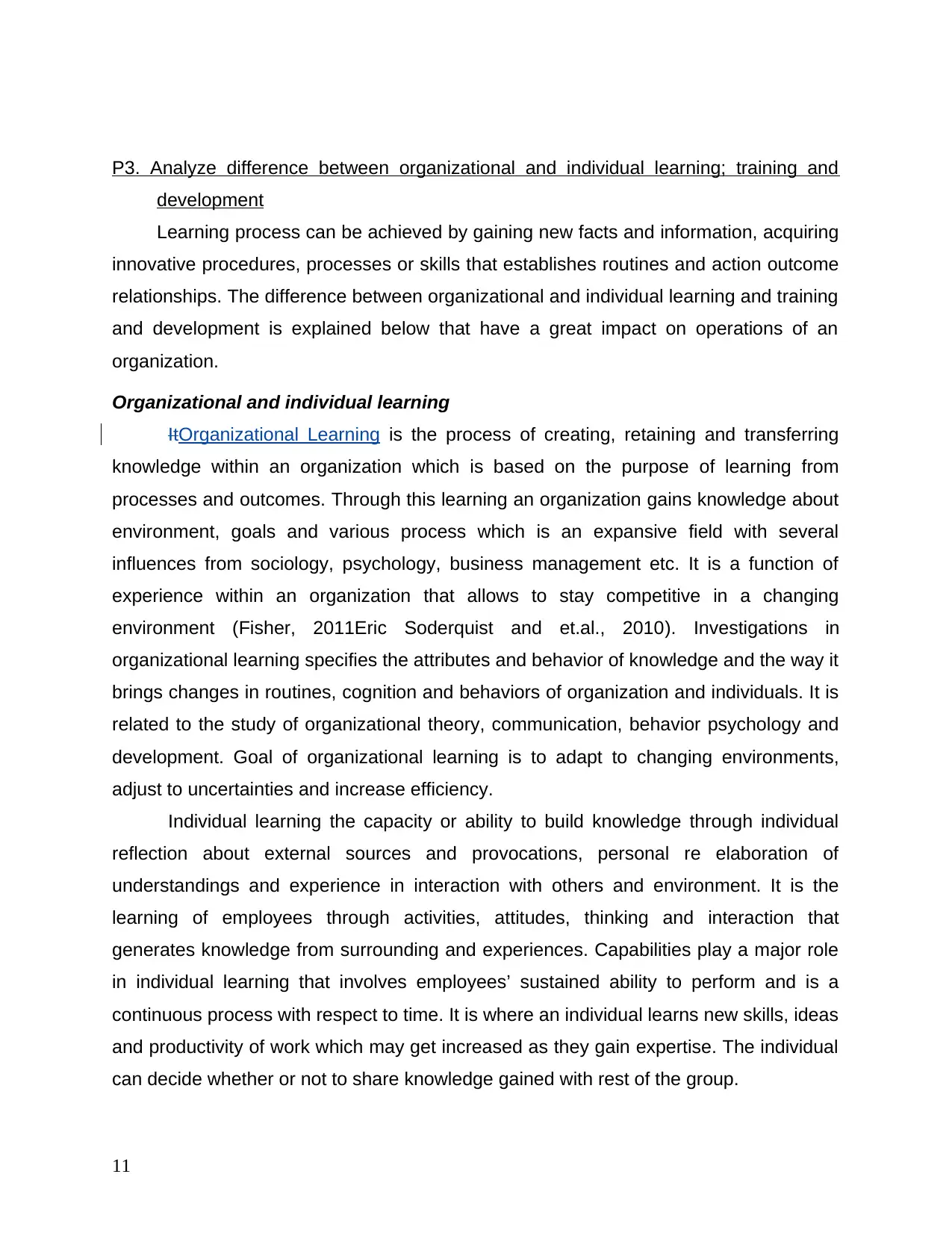
P3. Analyze difference between organizational and individual learning; training and
development
Learning process can be achieved by gaining new facts and information, acquiring
innovative procedures, processes or skills that establishes routines and action outcome
relationships. The difference between organizational and individual learning and training
and development is explained below that have a great impact on operations of an
organization.
Organizational and individual learning
ItOrganizational Learning is the process of creating, retaining and transferring
knowledge within an organization which is based on the purpose of learning from
processes and outcomes. Through this learning an organization gains knowledge about
environment, goals and various process which is an expansive field with several
influences from sociology, psychology, business management etc. It is a function of
experience within an organization that allows to stay competitive in a changing
environment (Fisher, 2011Eric Soderquist and et.al., 2010). Investigations in
organizational learning specifies the attributes and behavior of knowledge and the way it
brings changes in routines, cognition and behaviors of organization and individuals. It is
related to the study of organizational theory, communication, behavior psychology and
development. Goal of organizational learning is to adapt to changing environments,
adjust to uncertainties and increase efficiency.
Individual learning the capacity or ability to build knowledge through individual
reflection about external sources and provocations, personal re elaboration of
understandings and experience in interaction with others and environment. It is the
learning of employees through activities, attitudes, thinking and interaction that
generates knowledge from surrounding and experiences. Capabilities play a major role
in individual learning that involves employees’ sustained ability to perform and is a
continuous process with respect to time. It is where an individual learns new skills, ideas
and productivity of work which may get increased as they gain expertise. The individual
can decide whether or not to share knowledge gained with rest of the group.
11
development
Learning process can be achieved by gaining new facts and information, acquiring
innovative procedures, processes or skills that establishes routines and action outcome
relationships. The difference between organizational and individual learning and training
and development is explained below that have a great impact on operations of an
organization.
Organizational and individual learning
ItOrganizational Learning is the process of creating, retaining and transferring
knowledge within an organization which is based on the purpose of learning from
processes and outcomes. Through this learning an organization gains knowledge about
environment, goals and various process which is an expansive field with several
influences from sociology, psychology, business management etc. It is a function of
experience within an organization that allows to stay competitive in a changing
environment (Fisher, 2011Eric Soderquist and et.al., 2010). Investigations in
organizational learning specifies the attributes and behavior of knowledge and the way it
brings changes in routines, cognition and behaviors of organization and individuals. It is
related to the study of organizational theory, communication, behavior psychology and
development. Goal of organizational learning is to adapt to changing environments,
adjust to uncertainties and increase efficiency.
Individual learning the capacity or ability to build knowledge through individual
reflection about external sources and provocations, personal re elaboration of
understandings and experience in interaction with others and environment. It is the
learning of employees through activities, attitudes, thinking and interaction that
generates knowledge from surrounding and experiences. Capabilities play a major role
in individual learning that involves employees’ sustained ability to perform and is a
continuous process with respect to time. It is where an individual learns new skills, ideas
and productivity of work which may get increased as they gain expertise. The individual
can decide whether or not to share knowledge gained with rest of the group.
11
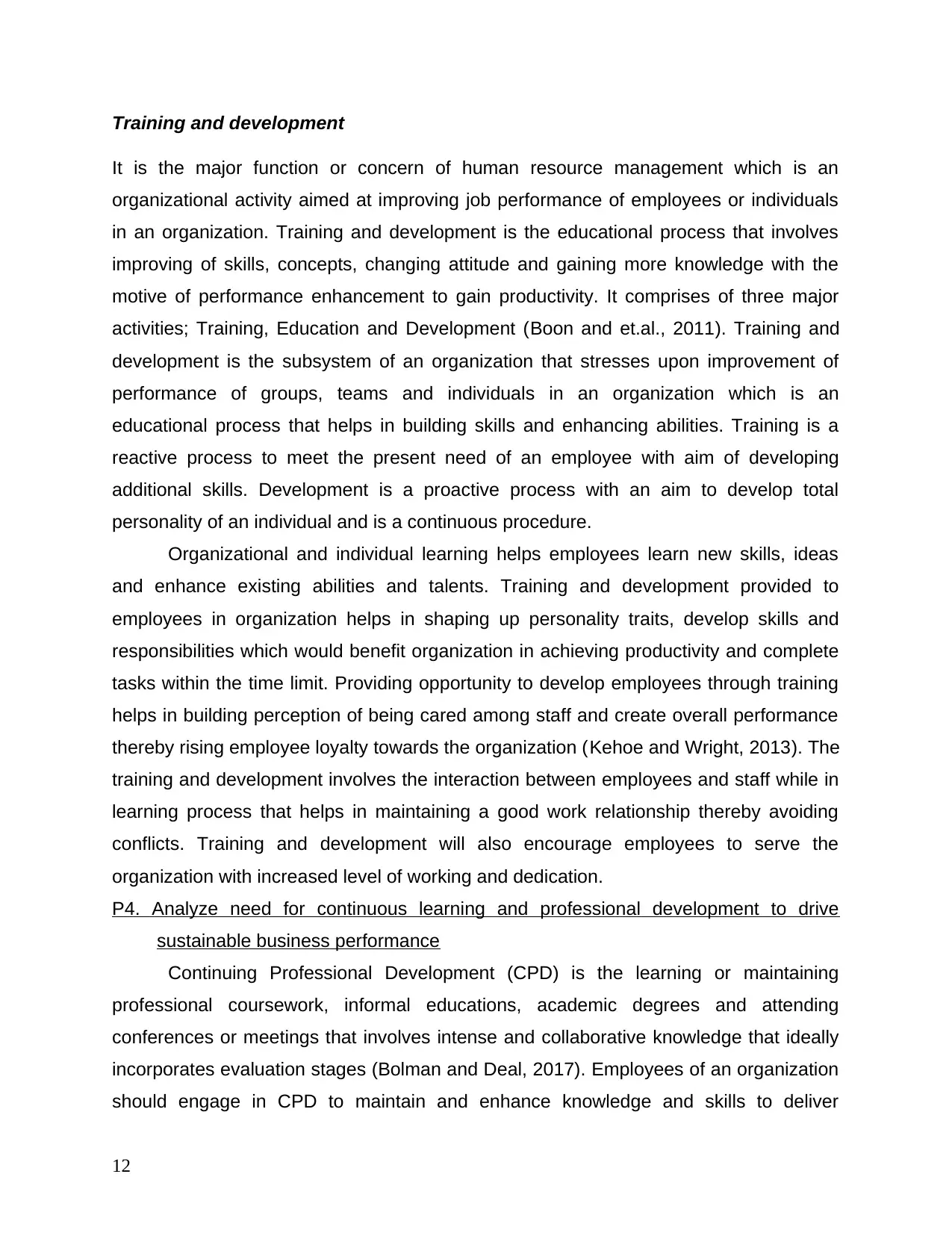
Training and development
It is the major function or concern of human resource management which is an
organizational activity aimed at improving job performance of employees or individuals
in an organization. Training and development is the educational process that involves
improving of skills, concepts, changing attitude and gaining more knowledge with the
motive of performance enhancement to gain productivity. It comprises of three major
activities; Training, Education and Development (Boon and et.al., 2011). Training and
development is the subsystem of an organization that stresses upon improvement of
performance of groups, teams and individuals in an organization which is an
educational process that helps in building skills and enhancing abilities. Training is a
reactive process to meet the present need of an employee with aim of developing
additional skills. Development is a proactive process with an aim to develop total
personality of an individual and is a continuous procedure.
Organizational and individual learning helps employees learn new skills, ideas
and enhance existing abilities and talents. Training and development provided to
employees in organization helps in shaping up personality traits, develop skills and
responsibilities which would benefit organization in achieving productivity and complete
tasks within the time limit. Providing opportunity to develop employees through training
helps in building perception of being cared among staff and create overall performance
thereby rising employee loyalty towards the organization (Kehoe and Wright, 2013). The
training and development involves the interaction between employees and staff while in
learning process that helps in maintaining a good work relationship thereby avoiding
conflicts. Training and development will also encourage employees to serve the
organization with increased level of working and dedication.
P4. Analyze need for continuous learning and professional development to drive
sustainable business performance
Continuing Professional Development (CPD) is the learning or maintaining
professional coursework, informal educations, academic degrees and attending
conferences or meetings that involves intense and collaborative knowledge that ideally
incorporates evaluation stages (Bolman and Deal, 2017). Employees of an organization
should engage in CPD to maintain and enhance knowledge and skills to deliver
12
It is the major function or concern of human resource management which is an
organizational activity aimed at improving job performance of employees or individuals
in an organization. Training and development is the educational process that involves
improving of skills, concepts, changing attitude and gaining more knowledge with the
motive of performance enhancement to gain productivity. It comprises of three major
activities; Training, Education and Development (Boon and et.al., 2011). Training and
development is the subsystem of an organization that stresses upon improvement of
performance of groups, teams and individuals in an organization which is an
educational process that helps in building skills and enhancing abilities. Training is a
reactive process to meet the present need of an employee with aim of developing
additional skills. Development is a proactive process with an aim to develop total
personality of an individual and is a continuous procedure.
Organizational and individual learning helps employees learn new skills, ideas
and enhance existing abilities and talents. Training and development provided to
employees in organization helps in shaping up personality traits, develop skills and
responsibilities which would benefit organization in achieving productivity and complete
tasks within the time limit. Providing opportunity to develop employees through training
helps in building perception of being cared among staff and create overall performance
thereby rising employee loyalty towards the organization (Kehoe and Wright, 2013). The
training and development involves the interaction between employees and staff while in
learning process that helps in maintaining a good work relationship thereby avoiding
conflicts. Training and development will also encourage employees to serve the
organization with increased level of working and dedication.
P4. Analyze need for continuous learning and professional development to drive
sustainable business performance
Continuing Professional Development (CPD) is the learning or maintaining
professional coursework, informal educations, academic degrees and attending
conferences or meetings that involves intense and collaborative knowledge that ideally
incorporates evaluation stages (Bolman and Deal, 2017). Employees of an organization
should engage in CPD to maintain and enhance knowledge and skills to deliver
12
⊘ This is a preview!⊘
Do you want full access?
Subscribe today to unlock all pages.

Trusted by 1+ million students worldwide
1 out of 22
Related Documents
Your All-in-One AI-Powered Toolkit for Academic Success.
+13062052269
info@desklib.com
Available 24*7 on WhatsApp / Email
![[object Object]](/_next/static/media/star-bottom.7253800d.svg)
Unlock your academic potential
Copyright © 2020–2026 A2Z Services. All Rights Reserved. Developed and managed by ZUCOL.



